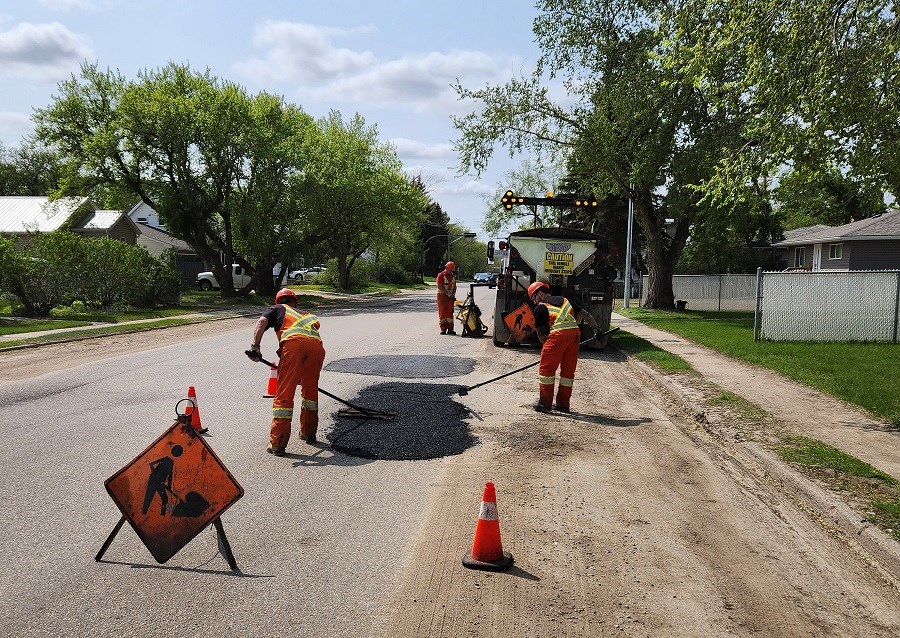City hall has rented Weyburn’s pothole repair truck since Aug. 1 because Moose Jaw’s chronically broken vehicle has been shelved since mid-July, but that rental will soon become a new purchase.
During its Aug. 28 regular meeting, city council approved the sole source purchase of a pothole truck from the City of Weyburn for $273,350 to replace existing Unit 169. To pay for the vehicle, $70,100 will come from the 2023 gravel roadways budget, $62,404 will come from this year’s traffic control budget and $140,846 will come from the truck’s accumulated depreciation value.
To purchase a completely new truck with pothole equipment would cost $430,000 to $450,000.
Moose Jaw operates pothole repair trucks Unit 169 and Unit 108, with the former a 2014 International — equipped with a thermal lay asphalt Unit — slated for replacement in 2029 and the latter a 2005 thermal lay asphalt Unit-equipped GMC slated for replacement this year, a council report explained.
Public works is replacing Unit 108 with a 2023 Freightliner, while it will refurbish and mount the existing 10-year-old thermal lay asphalt unit onto the truck.
Unit 169 has experienced “persistent operational issues” this year — engine problems — that have seen public works staff spend 86 hours fixing the machine and $15,605.43 on parts, while the truck has been shelved for half of this year’s construction season, the report said.
Furthermore, public works has kept the machine parked since July 17 because estimated repair costs are $12,000 to $18,000 and repair time is three to six weeks.
City hall became aware in July that Weyburn had a pothole truck, a 2022 Freightliner with 4,000 kilometres and 400 engine hours and equipped with a 2022 thermal asphalt lay unit, said the report.
In late July, fleet services staff reviewed, drove and tested the truck, observed that it was kept in a heated, covered building and confirmed that it was in a “like-new condition.”
In August, city hall signed a monthly rental agreement with Weyburn for $3,000 per month, with 75 per cent of the rental price applied to the purchase price, the report added.
“We replaced the hydraulic hoses when we first received it, but our operators are very happy with this unit … ,” Bevan Harlton, director of engineering, said during the meeting. “It’s like new.”
Council queries
When asked what projects wouldn’t proceed this year because of reduced budgets, the engineering director said several initiatives would be affected.
With traffic control, signalized intersections along First Avenue Northwest will not proceed this year but could if included in the 2024 budget. Meanwhile, with gravel roads, city crews will spread less material before grading them, while some of the less travelled ones will not receive any rehabilitation or reconstruction.
However, public works has completed upgrading gravel roads on Ninth Avenue Southeast from Coteau Street to the border with the adjacent rural municipality, upgrades that the wastewater treatment plant and SaskPower’s project are driving, Harlton continued.
The next locations to fix include 32nd Avenue and Coteau Street West. Also, Home Street East near the Sportsman Centre could be addressed using operational money.
When asked whether there was a backlog of pothole repairs, Harlton said he didn’t know, but assumed having only one pothole repair truck hurt operations this year.
Council concerns
Coun. Dawn Luhning expressed concern with how city administration failed to tell council that Unit 169 was broken when she brought forward her motion — that council defeated — in July to contract out pothole filling.
Now, council is approving taking money from two other accounts to purchase a truck that public works will use briefly in September, she continued. She also expressed confusion about why city hall didn’t look for outside help when Moose Jaw was in “a significant crunch” of pothole repairs.
Harlton apologized, saying he unintentionally misled council with his pothole-related contracting report. He noted that the document recognized how public works was working with contractors to repair utility cut road deficiencies. However, he was unable to communicate that clearly because of technical issues that evening.
When asked why city administration didn’t use money from the equipment reserve for this purchase, finance director Brian Acker explained city hall has had a “systemic problem” with that account through the years. Specifically, the replacement value of items has not been adjusted to reflect significant price increases.
Therefore, city hall has relied on items’ accumulated depreciation when replacing them, which has drawbacks since it was hoped equipment like Unit 169 would last longer, he continued.
“So, the reality is, this, coupled with many other pieces of equipment in engineering, there really (are) no surplus funds … (or anything) in the control account,” Acker added.
One pothole repair season is winding down, but another will arise next year once the snow melts, just like every year, said Coun. Heather Eby. She was pleased that the city would have two machines working when those infrastructure issues popped up and agreed with the purchase.
The next regular council meeting is Monday, Sept. 11.
In response to some providers blocking access to Canadian news on their platforms, our website, MooseJawToday.com will continue to be your source for hyper-local Moose Jaw news. Bookmark MooseJawToday.com and sign up for our free online newsletter to read the latest local developments.




